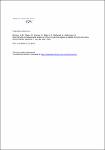Determinants of tetanus and seasonal influenza vaccine uptake in adults living in Germany
Böhmer, Merle
Walter, Dietmar
Krause, Gérard
Müters, Stephan
Gößwald, Antje
Wichmann, Ole
The primary objective of this study was to assess determinants of vaccine uptake in adults living in Germany exemplified by one standard vaccination (tetanus) and one vaccination targeting specific risk-groups (seasonal influenza). Data from 21,262 telephone household-interviews representative of the adult population in Germany were collected in 2009 and analysed. A total 73.1% of the adult population had a sufficient tetanus vaccination status according to national recommendations (i.e. last tetanus shot ≤10 years ago). Influenza vaccination coverage in the target population (i.e. persons ≥60 years, chronically ill, healthcare workers) was 44.1%. Persons who received professional vaccination advice within the past five years were more frequently vaccinated against tetanus and influenza than persons without (p< 0.001). Private physicians were identified as the most important source for vaccination advice. Having a statutory health insurance, last physician contact < 1 year ago, and living in the eastern part of Germany were independently associated with higher tetanus and influenza vaccine uptake. Low socio-economic status, two-sided migration background, and the feeling of being insufficiently informed on the benefits of vaccination were independently associated with low uptake of tetanus but not influenza vaccines. Our results show that tetanus vaccination coverage in the general adult population and influenza vaccination coverage in the target population are unsatisfactorily low in Germany. Since physicians' advice has a major impact on the vaccination decision, physician reminder systems could provide a method to increase vaccination coverage in adults. For tetanus, information activities should target population groups with an increased risk of being undervaccinated.
Dateien zu dieser Publikation
Keine Lizenzangabe

